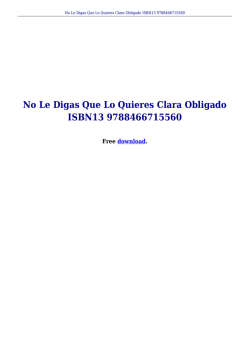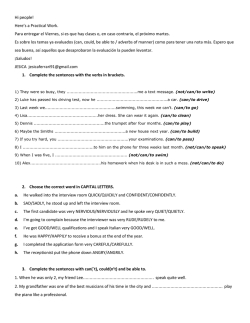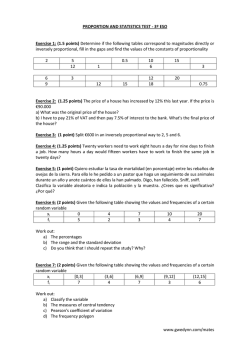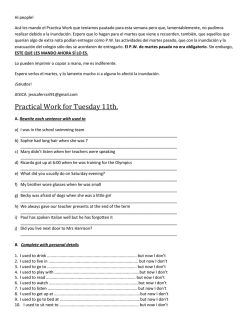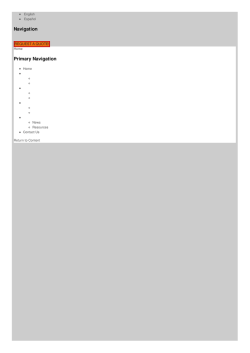
File - Ana C. Oropeza
The Portrayal of Feminism in the Poetry of Alfonsina Storni By: Ana Oropeza WLC 400 Spring 2015 Advisors: Dr. Donaldo Urioste and Dr. Rafael Gómez Abstract The purpose of this essay is to discuss and analyze the feminist poetry of the Argentine poet Alfonsina Storni, and to examine how her poems "Tu me quieres Blanca" [You want me White], "Hombre pequeñito" [Little, Little Man] and "La que comprende" [She Who Understands] defend and reaffirm the rights of women, and reflect the feminist movement in Argentina during the early twentieth century. I address the influences that made Storni rebel against the rules imposed by society on women. Via her poetry, I demonstrate how women of that era felt trapped in the face of injustice and inequality. Storni exposes the horrible condition of women in Argentine and Spanish American societies, and demands justice and dignity for all women. In this light, Storni defies the norms of Argentine society and exposes the oppression generated by men over women. Research Questions What is the women’s role in Latin America society in early twentieth century? How does Alfonsina react to the role of “ La Señorita”? How does Alfonsina Storni portrayals feminism in her literary works? Why did I chose this topic? I chose this topic because… I wanted to learn about how women have been depraved of equal rights. I wanted to discover what inspired women to become feminist writers. Significance of my Study My investigation demonstrates how Alfonsina Storni represents women who have no voice in a system where men have had all power. At the beginning of the twentiethcentury, she defied Argentine society by exposing and rejecting men’s disregard for women. Storni breaks the moral and social rules in her poetry where she exposes men’s disregard toward women which is relative to their attitude and treatment to women. Feminism: Definitions The advocacy of women's rights on the grounds of political, social, and economic equality to men. Patriarchy: and A system of society or government in which men hold the power women are largely excluded from it. Machismo: Strong or aggressive masculine pride. Feminist Women in Literature during the XX Century • Gabriela Mistral, Juana de Ibarbourou and Alfonsina Storni. • The central idea in their literary works was the role of women in society. • In 1938, These three great figures feminists met in the university of Montevideo, Uruguay to give a lecture to the students about how creating poetry and of the roll that they give him to the woman in his poetry. • Its encounter caused history because their work was not accepted in their country of origin and even so they transcended opposite by their controversial message against the rules imposed by men. Storni was most outstanding between the three because… • Her criticism towards men was more direct and strong • She freely talk about issues that Mistral and Ibarbourou did not dare to speak so openly • She was the most prominent in controversial issues like sex and love The image of “La Señorita” in Latin America Candidate to become a wife Takes care of her moral reputation “Virginity” was seen as the most important thing in a woman A women who maintains a good reputation will be “blessed to have a husband” Alfonsina Storni • • • • • She was a born on May 29, 1892October 25, 1938 Even though she was born in Switzerland, she is considered an Argentine poet because she was raised there since childhood Her family was Swiss and they joined the wave of European immigrants who emigrated to Argentina in 1880 She was the fourth child The family had financial problems that lead her to start working at the age of eleven and give up studying At the age of fourteen she was part of a theatrical troop directed by Manuel Cordero and traveled throughout Argentina. She managed to continue her studies and in 1910 she became a teacher She worked for a local magazine where she began to write and publish her writings At the age of twenty, she got pregnant by a man twentyfive years older than her and who was married Storni moved to Buenos Aires, Argentina with her son Alejandro Storni knows that she will face strong criticism due to her unwealthy mother status. For this reason she was determined to confront the moral prejudices Her arrival in Buenos Aires was not easy but thanks to his talent and interest in writing might work in many places to support his son In 1916, her great talent in writing poetry, she chooses writing as a profession and thus managed to publish his first book, entitled “La inquietud del rosal”, which was not very successful. It was not until her next publication, entitled “ El dulce daño’’, and her poem “Tú me quieres blanca’’, which was well received by intellectuals in Argentina In 1919, she published her next books titled “Irremediable” and “Languidez” Her fame continued to grew as she wrote for important journals like “La Nota” and “La Nación” were she used the Lao Tao pseudonym. In this section of the newspaper she defends the rights of women and continues to spread her femenist message through her poems “Tú me quieres blanca” “Hombres Necios” “Tú me quieres blanca” 1918 Tú me quieres alba, You want me dawn, me quieres de espumas, You want me sea foam, me quieres de nácar. You want me mother of pearl Que sea azucena To be a lily Sobre todas, casta. Above all, chaste. De perfume tenue. Of faint perfume. Corola cerrada . An unopened blossom. “Hombres Necíos” Hombres necios que acusáis Silly, you men-so very adept a la mujer sin razón, at wrongly faulting womankind, sin ver que sois la ocasión not seeing you're alone to blame de lo mismo que culpáis: for faults you plant in woman's mind. Translated by: Alan S. Trueblood Sor Juan Inés de la Cruz She was born on November 12, 1651 and died on April 17, 1695 in Mexico City • Sor Juana Ines de la Cruz in the seventeenth century chose to avoid the role of wife and mother to enter a convent to study • She wrote an autobiographical document which bears the title “Respuesta a Sor Filotea de la Cruz” in which defends the right of every woman primarily their right to study • Considered the first feminist in Latin • “Tú me quieres blanca” You want me dawn, Not even a moonbeam You want me sea foam, To caress me. You want me mother of pearl Nor a daisy To be a lily that may call herself my sister. Above all, chaste. You want me snow, Of faint perfume. You want me white, An unopened blossom. You want me dawn. You who had all The drinks at hand, With lips stained From fruits and honey. You who were in the feast, Who were covered with leaves, Who destroyed the flesh To celebrate Bacchus. You who in the black Gardens of deception Dressed in red Ran to ruin. You who still preserve Your skeleton. I don’t even know For what miracles You expect me white (May god forgive you), You expect me chaste (May god forgive you), You expect me dawn. Run away to the forest Leave for the mountains; Clean your mouth; Live in the shacks; Touch with your hands The wet earth; Feed your body With bitter root; Drink from the rocks, Sleep on the frost; Renew your flesh With salt and water; Speak with the birds And get up with dawn. And when your flesh Returns to you, And when you have put In it the soul, Which in the bedroom Was left tangled, Then, good man, Expect me white, Expect me snow, Expect me chaste. And when your flesh Returns to you, And when you have put In it the soul, Which in the bedroom Was left tangled, Then, good man, Expect me white, Expect me snow, Expect me chaste. Translated by Melissa Gioia and Laura Hakala “Hombre Pequeñito” Little little man, little little man, set free your canary that wants to fly. I am that canary, little little man, leave me to fly. I was in your cage, little little man, little little man who gave me my cage. I say "little little" because you don’t understand me Nor will you understand. Nor do I understand you, but meanwhile, open for me the cage from which I want to escape. Little little man, I loved you half an hour, Don’t ask me again. Translated by http://allpoetry.com/Little-Little-Man Symbolism Canary: • Represents women. Cage: • Represents the norms of society • The ignorance of men • Oppression “La que comprende” With her black hair fallen forward, The beautiful woman, of middle age, Is prostrate on her knees, while Christ in agony From his wooden cross looks down upon her with pity. In her eyes the burden of an enormous sadness, In her breast the burden of a child to be born, At the foot of the pale bleeding Christ she prays: "Lord, let not my child be born woman!” Translated by Kate Flores Works Cited "CVC. Alfonsina Storni. Biografía." CVC. Alfonsina Storni. Biografía. Instituto Cervantes (España), 2006. Web. 13 May 2015. <http://cvc.cervantes.es/actcult/storni/biografia.htm>. "El Avance De Los Derechos De La Mujer En El Siglo XX." Educ.ar. Ministerio De Educación, 23 Mar. 2012. Web. 13 May 2015. <http://www.educ.ar/recursos/ver?rec_id=70048>. Fariña Busto, María Jesús. "DE PURO CUERPO A UN CUERPO PROPIO. TEXTUALIZACIONES DEL DESEO EN ALGUNAS ESCRITORAS HISPÁNICAS." Versants (Suiza) 2003: 243-59. Web. 13 May 2015. Garrido, Lorena. "Nº 28." Storni, Mistral, Ibarbourou: Encuentros En La Creación De Una Poética Feminista. Documentos Lingüísticos Y Literarios 28, 2005. Web. 13 May 2015. <http://www.humanidades.uach.cl/documentos_linguisticos/document.php?id=90>. "Hombre Pequeñito by Alfonsina Storni." - Famous Poems, Famous Poets. All Poetry, n.d. Web. 13 May 2015. <http://allpoetry.com/Hombre-Pequeito>. Mora, Ana. "Alfonsina Storni: La Mujer Y La Ciudad." Association of Hispanic Feminine Literature. Letras Femeninas, 2008. Web. 21 Apr. 2015. <http://www.public.asu.edu/~sev1987/Letrasfem/n_especial.html>. "Real Academia Española." Real Academia Española. N.p., n.d. Web. 13 May 2015. http://www.rae.es/. "Rosas Y Rosas... (Homenaje a Mis Poetas)." : La Que Comprende.. (Alfonsina Storni). Mis Poetas, 6 Oct. 2008. Web. 13 May 2015. <http://mispoetas-cani.blogspot.com/2008/06/la-que-comprende-alfonsinastorni.html>. "Tú Me Quieres Blanca - Alfonsina Storni - Ciudad Seva." Tú Me Quieres Blanca - Alfonsina Storni Ciudad Seva. Ciudad Seva, n.d. Web. 13 May 2015. <http://www.ciudadseva.com/textos/poesia/ha/storni/tumequi.htm>. Vallejo, Catharina De. "La Imagen De Lo Femenino En La Lírica De Los Poetas Del Romanticismo Hispanoamericano: Inscripción De Una Hegemonía." La Imagen De Lo Femenino En La Lírica De Los Poetas Del Romanticismo Hispanoamericano (n.d.): n. pag. Centro Virtual Cerventes. Thesaurus, 1993. Web. 1 May 2015. <http://cvc.cervantes.es/lengua/thesaurus/pdf/48/TH_48_002_104_0.pdf>. Zapata De Aston, Arcea. "De Una Sujeto Femenina a Una Sujeto Mujer Critica Pedagogías Del Cuerpo En Languidez Y Ocre De Alfonsina Storni." Perífrasis. Facultad De Artes Y Humanidades, 02 Aug. 2014. Web. 13 May 2015. <http%3A%2F%2Frevistaperifrasis.uniandes.edu.co%2Findex.php%3Foption%3Dcom_content%26v iew%3Darticle%26id%3D194%253Ade-una-sujeto-femenina-a-una-sujeto-mujer-critica-pedagogias-delcuerpo-en-languidez-y-ocre-de-alfonsina-storni%26catid%3D38%253Aindice%26lang%3Des>. Thank you!!!
© Copyright 2026

